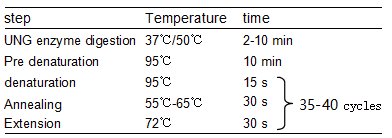Determine the necessary mass, volume, or concentration for preparing a solution.
Basic Description
| Specifications & Purity | UNG+High ROX | ||||||||||||||||||||||||||||||||||||||||||||
|---|---|---|---|---|---|---|---|---|---|---|---|---|---|---|---|---|---|---|---|---|---|---|---|---|---|---|---|---|---|---|---|---|---|---|---|---|---|---|---|---|---|---|---|---|---|
| Storage Temp | Store at -20°C,Avoid repeated freezing and thawing | ||||||||||||||||||||||||||||||||||||||||||||
| Shipped In | Ice chest + Ice pads | ||||||||||||||||||||||||||||||||||||||||||||
| Product Description | Product content
Product Introduction 2× GoldStar Probe Mixture (UNG) is a premixed system dedicated to real-time fluorescence quantitative PCR by probe method (TaqMan, Molecular Beacon, etc.), with a concentration of 2×, containing GoldStar Taq DNA polymerase, PCR Buffer, dNTPs (dTTP is all replaced by dUTP), UNG enzyme and Mg2+, which is easy and convenient to operate. It is mainly used for the detection of genomic DNA target sequences and cDNA target sequences after RNA reverse transcription, such as gene expression analysis, copy number analysis and SNP genotype analysis. This product utilizes the dUTP-UNG anti-pollution system, which adds dUTP during the preparation of the PCR reaction system, thus forming an amplification product containing dU bases. This product can be eliminated by the UNG enzyme in the PCR system before the next PCR reaction. This effectively removes residual contamination of the PCR product and greatly reduces false positives due to contamination of the amplification product.UNG enzyme can be inactivated at the pre-denaturation step in the PCR cycle, and therefore will not affect the formation of new PCR products containing dU bases. The GoldStar Taq DNA Polymerase contained in this product is a chemically modified, new high-efficiency hot-start enzyme, which has no polymerase activity at room temperature, effectively avoiding non-specific amplification due to non-specific binding of primers and templates or primer dimerization at room temperature, and the activation of the enzyme must be incubated at 95°C for 10 minutes. The unique combination of PCR buffer system and hot-start enzyme significantly improves the amplification efficiency of PCR with stronger fluorescent signal and higher sensitivity to detect single-copy templates. A wider linear range and more accurate quantification of the target gene can be obtained by using this product. ROX dye is used to correct the fluorescence signal error generated between wells of a quantitative PCR instrument, and is generally used in Real Time PCR amplifiers from ABI, Stratagene, and other companies. The excitation optics vary from instrument to instrument, so the concentration of ROX dye must be matched to the corresponding fluorescence quantitative PCR instrument. Instruments that do not require ROX calibration (G670150): Roche LightCycler 480, Roche LightCyler 96, Bio-rad iCyler iQ, iQ5, CFX96 and others. Instruments requiring Low ROX calibration(G665780): ABI Prism7500/7500 Fast, QuantStudio®3 System, QuantStudio®5 System, QuantStudio®6 Flex System, QuantStudio®7 Flex System, ViiA 7 system. Stratagene Mx3000/Mx3005P, Corbett Rotor Gene 3000, and more. Instruments requiring High ROX calibration(G665787): ABI Prism 7000/7300/7700/7900, Eppendorf, ABI Step One/Step One Plus, and others. matters needing attention Before use, please mix gently by turning up and down, avoid foaming as much as possible, and use after brief centrifugation. Avoid repeated freezing and thawing of this product, repeated freezing and thawing may degrade the product performance. This product can be stored for long term at -20℃, protected from light. If frequent use is required within a short period of time, it can be stored at 2-8℃. Usage The following examples are conventional PCR reaction systems and reaction conditions, which should be improved and optimized according to the template, primer structure and target fragment size in actual operation. 1.PCR reaction system
Note: 1) Usually, better results can be obtained with a primer concentration of 0.2 μM, and 0.1-1.0 μM can be used as a reference for setting the range. (2) The concentration of the probe used is related to the fluorescence quantitative PCR instrument used, the type of probe, and the type of fluorescent labeling substance, please refer to the instrument manual or the specific requirements for the use of each fluorescent probe for the adjustment of the concentration in actual use. (3) Usually the amount of DNA template is 10-100ng genomic DNA or 1-10ng cDNA as a reference. Since the templates of different species contain different copy numbers of target genes, the templates can be subjected to gradient dilution to determine the optimal amount of template to be used. (4) The excitation optical system varies from instrument to instrument, choose to add 50×Low ROX or 50×High ROX according to the instrument using fluorescence quantification. 2.PCR reaction program Caution! The pre-denaturation reaction of this product must be completed at 95°C for 10 minutes! Two-step PCR:
Note: 1) The hot-start enzyme used in this product must be activated under the condition of pre-denaturation 95℃, 10min. 2) It is recommended to use two-step PCR reaction program, if you can't get good experimental results due to the use of primers with lower Tm value, etc., you can try to carry out three-step PCR amplification. Three-step PCR:
|
Certificates
Certificate of Analysis(COA)
Enter Lot Number to search for COA:



